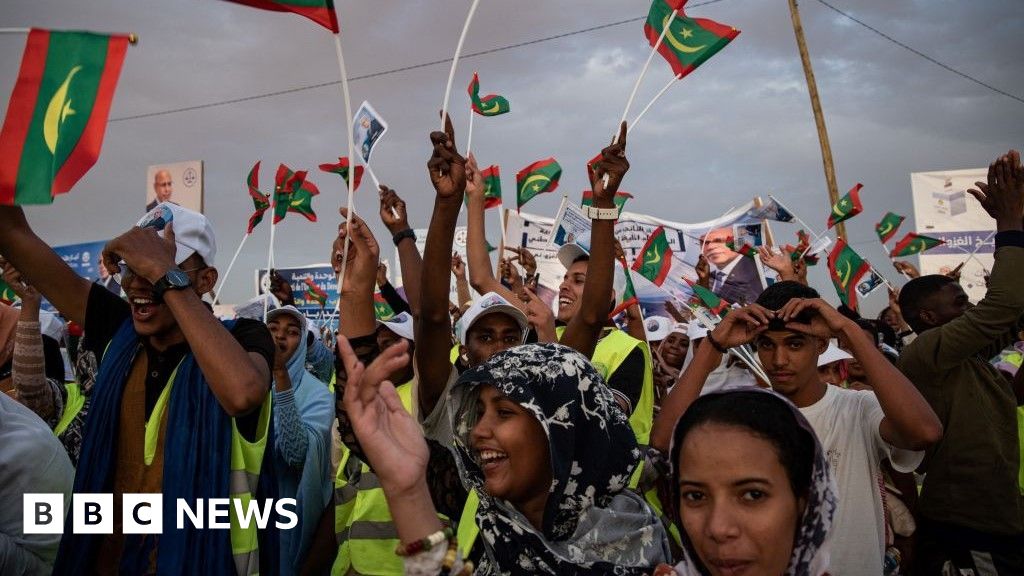
- author, Aaron Akinyemi and Danai Nesta Kubimba
- Role, BBC News
As Mauritanians head to the polls to cast their votes in a presidential election, the country faces a host of issues including the legacy of military coups, migration, jihadist attacks in neighboring countries, and the horrific legacy of slavery.
President Mohamed Ould Cheikh El Ghazouani, who has been in power since the country’s first democratic transition in 2019, is seeking a second and final term.
Six other candidates are competing with him for the top position.
These elections are a real test of Mauritania’s thriving democracy and an indicator of how far it has progressed on its path toward greater political openness.
When former President Mohamed Ould Abdel Aziz stepped down in 2019 after the end of his term, it ushered in a new era for a country that had suffered multiple military coups and authoritarian rule.
“Mauritania has the strongest democratic credentials in the Sahel at the moment, which is quite surprising given its history of coups,” Joseph Hammond, iDove’s African Union fellow, told the BBC.
Among the potential candidates for the presidency of Mauritania is Bayram Ould Dah Ould Abeid, who came in second place in the 2019 elections.
Mr. Obeid’s ancestors were slaves, and he spent much of his life fighting against the practice.
He has been arrested and imprisoned over the years for his work as head of the Initiative to Revive the Abolitionist Movement (IRA).
Slavery remains a sensitive issue in Mauritania, which was the last country in the world to ban slavery in 1981.
“My father fought slavery all his life,” Obaid told the BBC in 2016. “I swore to my father that I would fight it without any concessions. I would fight slavery and those who support it.”
Slavery has been abolished in the country three times, but thousands of black Mauritanians still live as unpaid domestic servants, while anti-slavery activists face repression.
An estimated 149,000 people are enslaved in Mauritania – about 3% of the population, according to the Global Slavery Index (GSI) in 2023.
Immigration is another hot-button issue that will be on voters’ minds when they head to the polls.
Mauritania is a major transit point for migrants trying to reach Europe from West Africa, with thousands of boats leaving the country last year.
In April, the European Union granted Mauritania €210 million (£177 million; $225 million) in aid – approximately €60 million of which will be invested in combating illegal migration to Europe.
Corruption remains a major problem in Mauritania.
Former President Aziz was sentenced to five years in prison on charges of illicit enrichment and embezzlement, and was disqualified from running in the elections.
The country is considered rich in various natural resources such as iron, gold and phosphate, and is an emerging market in the oil sector in Africa. However, approximately 59% of the population lives in poverty, according to the United Nations.
The country also has huge potential in renewable energy – especially green hydrogen. This type of energy could ultimately provide a cleaner alternative to fossil fuels and play a role in the country’s transition to carbon-free energy.
Investors from Europe, Asia and the Middle East, especially the United Arab Emirates, aim to make Mauritania an energy center for green hydrogen production, according to the Africa Center for Strategic Studies.
President Ghazouani also campaigned on the importance of the country’s security.
Mauritania is located in the Sahel, a semi-arid strip of land south of the Sahara Desert, which is a hotbed of jihadist activity, but the country has remained generally free of attacks since 2011.
But its neighbour Mali still suffers from repeated jihadist attacks.
Analysts have partly credited President Ghazouani, whose long career in the military and security services has given him a deep understanding of the jihadist challenges facing the Sahel.
AFP reported that President Ghazouani has succeeded in developing a close alliance with Western partners such as France and the United States, but he has also been keen to maintain relations with his military-run neighbors such as Mali, Burkina Faso and Niger, which have recently shunned Western influence.
Head of US Africa Command, General Michael Langley said Mauritania plays a “long-standing” role in countering terrorism and preventing violent extremism in the Sahel region.
Sheikhani Khalil, a professor of communications at the Lebanese International University in Mauritania, told the BBC that President Ghazouani had allied with Mauritania and the United States to combat the attacks.
He said, “The training conducted by the US Special Forces for the Mauritanian Special Forces units is ongoing to secure the national borders, which enhances the tactical capabilities and combat readiness of our armed forces.”
Analysts say Mauritania’s ability, as an important player in regional security, to continue this leadership role depends largely on an effective and peaceful transition of power that leads to a stable government.
More stories on the BBC about the crisis in the Sahel:
Image source, Getty Images/BBC




More Stories
Journalists convicted in Hong Kong sedition case
Stand News: Hong Kong journalists convicted of sedition in case critics say highlights erosion of press freedom
Shark decapitates teen off Jamaica coast